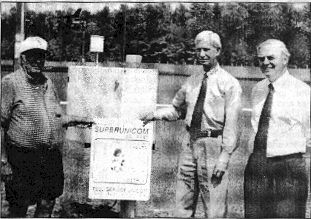FOLEY
AIRPORT INTRODUCES AUTOMATED PILOT SYSTEM
New
system thought to be first in state
By Bob Morgan
Staff Writer
FOLEY
- Foley Municipal Airport's new Superunicom is drawing rave reviews from local pilots and
those who visit the area and fly in and out of The Forward City.
The
$38,600 pilot-controlled automated systein is thought to be the first in the state and one
of only a handful in the Southeast.
"Everybody
just loves
it. People are calling from
Tennessee, Mississippi, South Carolina and other parts of Alabama to ask about it,"
says Aubrey Little Sr., who handles public relations for Foley
Municipal Airport.
Superunicom,
developed by Potomac Aviation Technology Corp. of Ft. Washington, Md., has been in place
at Foley Municipal Airport about two weeks. Through a series of radio clicks, pilots can
receive a basic airport advisory, extended advisory and radio transmission check, all
originating from a maintenance-free system not much bigger than a television box.
The
system speaks with clear, natural voice and composes its greetings and advisory messages
from digitally recorded human speech. The system's voice and behavior is so human some
pilots have mistaken it for a live person.
Three
radio clicks trigger an airport advisory with only pertinent information. The system
adapts advisory timing and content to the amount of system congestion. Advisories are
provided to pilots within about 10 miles of the airport.
Three
additional clicks after the basic advisory will give a pilot all the details, including
information that might have been abbreviated in the basic advisory.
Four
clicks trigger the radio-check. Superunicom will ask a pilot to transmit a brief message,
then the system will echo-transmits the message back to the pilot.
Superunicom,
which automatically greets inbound pilots, is aware of an airport's runways and
configurations and local operating preferences. It also continuously measures current
weather data and balances the information against the level of congestion on the system
frequency.
Foley
Municipal Airport Manager Joe Bouzan says Superunicom should definitely enhance the safety
factor at the airport.
What
kinds of safety hazards might the system prevent?
Plant
City, Fla.: A 56-year-old student pilot lining up his Cessna on final approach has a Piper
Cadet piloted by a 19-year-old land on top of him, the two airplanes becoming interlocked
at a height of 200 feet.
Arlington,
Texas: A Cessna 150 lands on top of a Cessna 152 approximately two feet above the runway.
It is believed both air-planes entered the traffic pattern at approximately the same time
but with the Cessna 152 at a lower altitude.
While
neither incident resulted in injuries, both could have.
Foley Mayor Tim Russell says the Superunicom system should be a "great safety
factor" for the airport in preventing similar aerial mishaps locally.
For
example, since Superunicom is aware of an airport's runway configuration, winds and
traffic, it will actually call a specific runway based on prevailing winds and an analysis
of aircraft transmission patterns of other aircraft over the system. It will call that
runway only when conditions unambiguously recommend one runway over another and when there
is no potential for conflicting traffic.
"I
have the pleasure of flying quite a bit and safety measures are important to pilots,"
says Russell, himself a pilot. He says at some airports it's a challenge for a pilot to
hear and understand what is being said by airport personnel.
Jim
Owens of Gulf Shores, who writes aviation insurance and has been flying since 1940, says
the new system should be helpful to local pilots since only a few airports in the state
have control towers. Owens listed those as Brookley in Mobile (day only), Mobile Regional,
Montgomery, Dothan, Tuscaloosa (day only),
Birmingham, Huntsville and Muscle Shoals (day only).
Owens,
who flies out of Foley Municipal Airport, says other than the airports listed above others
have no control of traffic and offer only advisory information.
"It's
entirely up to the pilot to look for traffic, to announce where you are and what you are
doing," he says of flying in and out of small airports.
Bouzan
says pilots flying in to Foley Municipal Airport and going back home have helped spread
the word about the Superunicom.
Russell
gives Bouzan and Little credit for spearheading the move to get the Superunicom system at
the airport.
Other
aspects of the system include the following:
·
Alerts pilots
to significant conditions such as ground fog crosswinds and windshear.
·
Alerts pilots
to significant wind changes from last advisory.
·
The totally
self-contained system is typically located at the airport's windsock, so pilots are
afforded realistic runway conditions.
·
Alerts inbound
pilots to the presence of other air traffic the pattern.
Little
says Foley Municipal Airport is constantly being praised by visitors for its beauty and
facilities and for improvements funded by the city through mayor and council.
Bob Morgan/Staff
Photo

Pictured at the airport Is Aubrey Little Sr., public relations director at the Foley Municipal Airport, Joe Bouzan, airport manager, and Foley Mayor Tim Russell.